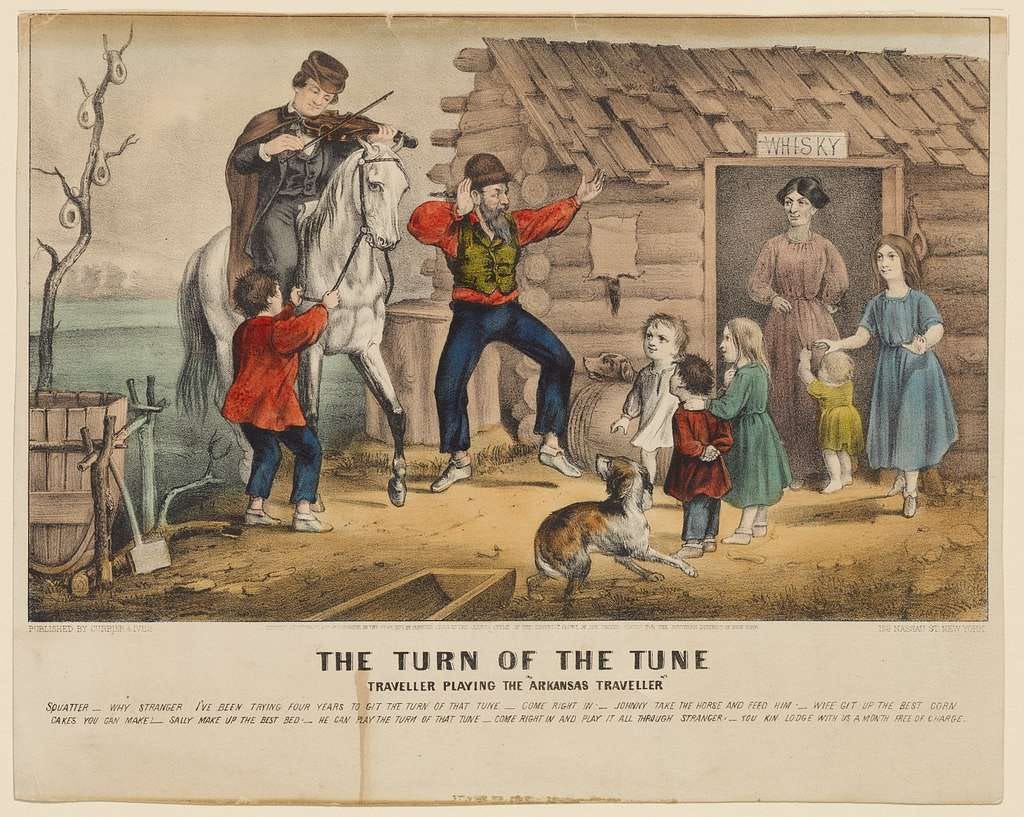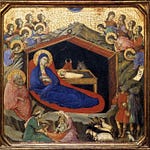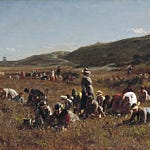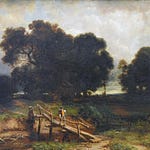One of my favorite moments early in the Divine Comedy comes when Virgil, who has just identified himself, gives Dante “what for,” because the Florentine is dawdling at the dismal bottom of the mountain, which he should be climbing instead, toward the sun. “Ma tu,” says Virgil, “perché ritorni a tanta noia?” Which means, in a loose translation, “But you, what-for you a-goin’ back-a to Jersey?” (Sorry, our good friends in New Jersey, but the Pennsylvania boy couldn’t resist!)
Dante, of course, had had quite a turn, what with the leopard, the lion, and the she-wolf blocking his way up the hill. He had determined to climb, and he turned to it with a will, but the beasts made him turn back. And that’s how it would have remained, for good, but then suddenly another man turned up. Who could it be? Of all the people in the world, he turned out to be Virgil, the greatest of all Latin poets! Would Dante turn against such a man? Never! “You are my teacher, my authority,” he said, abashed and overcome with wonder, and he begged Virgil to help him get out of there. But then it was Virgil’s turn to speak. He doesn’t tell Dante to turn over a new leaf. It’s not in Dante’s unassisted power to do that; no easy optimism here. He doesn’t tell Dante to turn in for a good morning nap, after which they’ll decide where to turn. “It is another voyage you must take,” says Virgil, revealing to the younger poet that they must go on a journey through all the regions of hell, and then purgatory — and then, if all is well, he will turn Dante over to another soul, worthier than he is, to show him the realms of the blessed above. So Dante says, “Let us then be on our way.”
What a Word of the Week is our English turn! English grammar is really easy by comparison with Italian verbs and pronouns, Russian nouns, Hebrew verbs, Greek anything; what makes basic English hard are the verbal idioms, verbal phrases that sometimes act as pure verbs, sometimes as verbs with an adverb that retains a sense of position or motion, and sometimes — who knows what? It’s enough to make your face turn red. You can turn in, meaning go to bed, so that you can get some rest before you turn in your book report, unless of course you spend all night turning in bed.
In and into are usually close in meaning, but not with turn: a good cop turns in a thief; a cop gone bad turns into a thief! “I am confident,” says the scapegrace and spendthrift Mr. Micawber, “that something — will turn up!” He eventually lands a job as an under-clerk for Uriah Heep, which wasn’t exactly turning up roses. You can turn out robots in your factory, but you can’t turn a robot out of your house; you can only do that to people. But you can return him to the factory, saying that the free trial with old Robbie didn’t turn out well. We don’t commit these uses to memory. Children learn them without thinking about them. But gosh, somebody learning English must have to turn to the phrase book all the time to get them right! To turn — is it good or bad? We can’t be converted unless we turn or are turned: that’s what it means to be converted. We can say, with hope of triumph, “The worm has turned!” Or, surprising an enemy, “The tables are turned!” Or, giving somebody a taste of his own medicine, “Turnabout is fair play!” But watch out. Sure, the worm can turn. But the milk can turn, too.
Our word turn comes from the Norman French, torner, which goes back through Latin to the Greek tornos, a lathe. That’s what a Turner does, right? He turns wood on a lathe to make posts and rods and dowels and such. The Greek word comes from an Indo-European root meaning to rub, to bore a hole, to twist. It’s how you make a pot round; it’s how you drill a hole for a peg; it’s how you twist thread for a rope. Any distant cousins in English? Sure. Indo-European t became Germanic th: so we have English thread, for the twisting of the fibers, and, yes, English throw. Can you throw a pot, in English? Yes, by letting it rub against your hands as it spins on the potter’s wheel; and then, when it’s hardened, by grabbing it and swinging your arm and — well, you get the idea!
Word & Song is an online magazine devoted to reclaiming the good, the beautiful, and the true. We publish six essays each week, on words, classic hymn, poems, films, and popular songs. Paid subscribers receive audio-enhanced posts, a weekly podcast (alternately Poetry Aloud or Anthony Esolen Speaks), access to our full archive of over 700 essays and may comment on posts.
To support this project, please join us as a free or paid subscriber.














